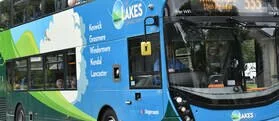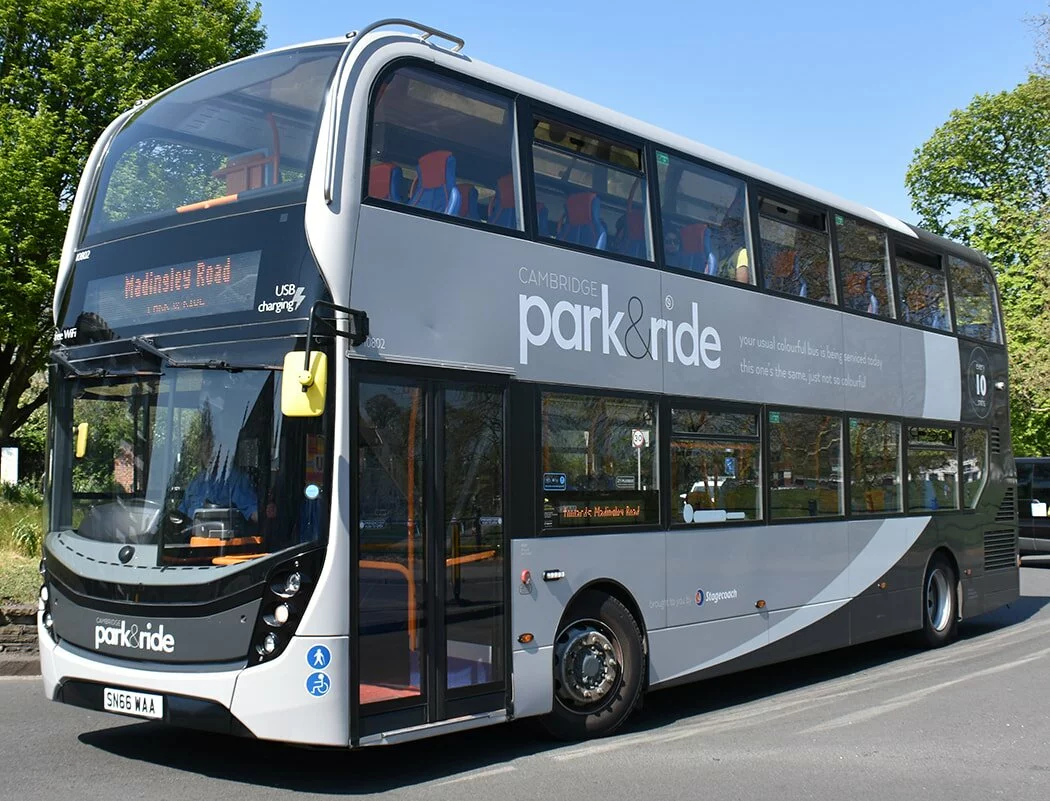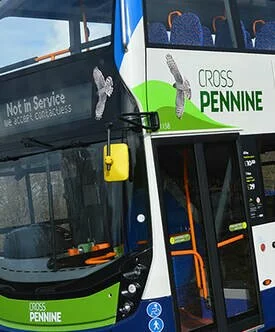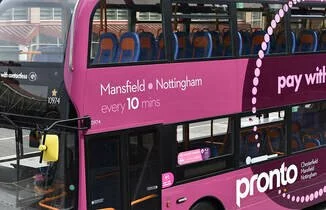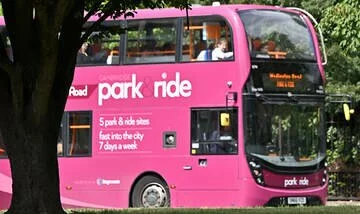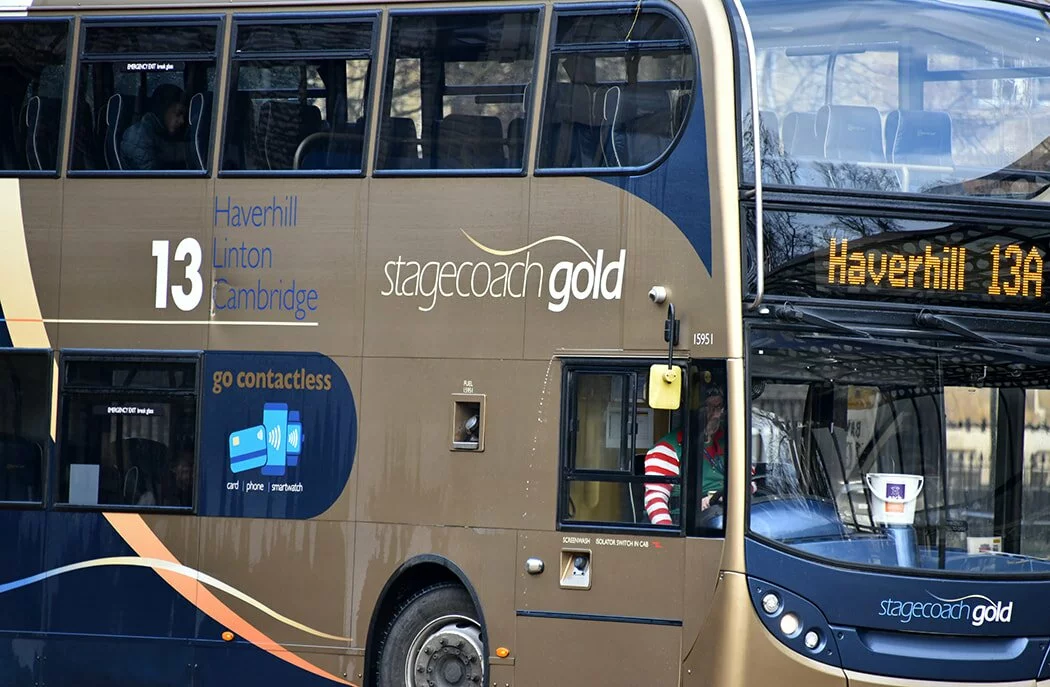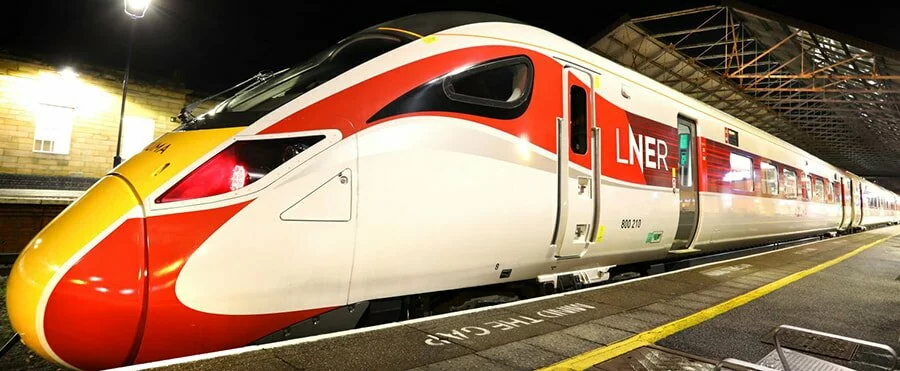- Home Page
- Fleet News Ramblings
- SKM News Views & Blog
- Behind The Picture
- Contact us
Stagecoach: Three livery variations (or thirty)?25/3/2020 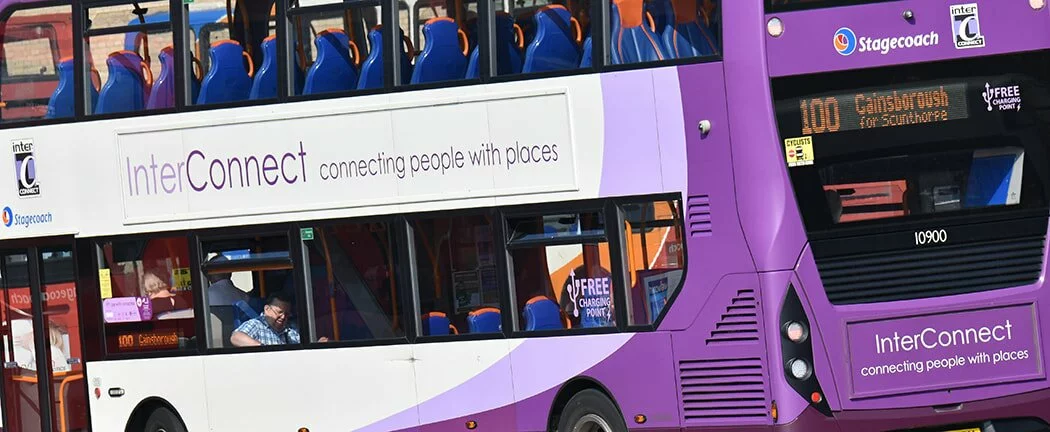
Back in January Stagecoach unveiled its new image with three distinct bus and coach liveries. But, it wasn’t long before the OpCos in Manchester and Cambridge created two more for provincial electric buses, although the both did have a hint of the Ocean Green colour from the ‘Specials’ livery.
So that makes five….. But that’s not the end of the story. News reached us from the East Midlands that buses were still being painted in the purple/violet InterConnect livery which is based on the former Stagecoach ‘Beach Ball’ livery. Head further north and the Cumbria & North Lancashire business is still painting buses in the very attractive Lakes Connection livery. Back to Cambridge and the Busway brand is being applied to Cambridgeshire Busway vehicles which now carry all over Ocean Green livery, rather than the ‘Specials’ version of the new livery scheme (in fact as far as we are aware no buses carry the ‘Specials’ Ocean Green livery - the Enviro 200MMC used for the livery launch was rapidly repainted into the ‘Stagecoach Local’ livery within days). But now it seems, although we have no official confirmation from Stagecoach, that where there is a recognisable and strong brand already in use then it can continue to be used. We would expect this to include Stagecoach East’s X5 and Park & Ride brands, Stagecoach East Midland’s InterConnect and Pronto brands, Stagecoach Cumbria & North Lancashire’s Lakes Connection and Cross-Pennine liveries and branding. Add to that Megabus and Oxford Tube. But let’s not forget there is a national brand, a brand that in some areas outnumbers buses in corporate livery - Stagecoach Gold. We suspect that there is now dispensation for this brand to continue to be used. If that is the case then it is bad news for the team at Stagecoach Oxfordshire who were refused new buses in Stagecoach Gold livery last year and now operate Enviro 400MMCs in the old corporate livery on routes previously marketed under the Stagecoach Gold banner. If our assumption is correct and lots of existing liveries and brands can be retained it makes a mockery of the new Stagecoach identity. Now it seems LNER could retain Class 91s and Mk 4s until the end of 202325/3/2020 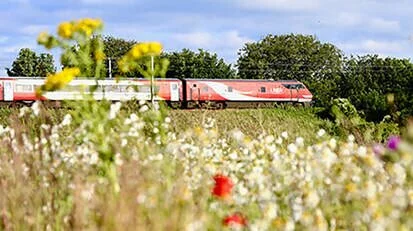 © LNER © LNER
Every now and then an online story catches the attention and there sat one of them yesterday. Respected rail journalist Richard Clinnick from RAIL magazine broke the (welcome) news that LNER is being forced to extend its planned use of Class 91 and Mk 4 trains yet again.
Due to be withdrawn by June this year, first there was an extension planned through until the end of 2021 and now Richard has revealed in his news story that they could remain in service until the end of 2023 with ten operational sets and two spare Class 91s along with spare coaches being retained on LNER books. So what has gone wrong? In the same story Richard adds that LNER needs six more trains and the procurement lead time necessitates retaining the Class 91s and Mk4s. So why are more trains needed. Is the timetable far too ambitious for the existing number of trains? If so do we have another Virgin CrossCountry issue here? Or, is maintenance of the trains taking longer? Perhaps Hitachi is are the train and maintenance provider to LNER for its new trains has suddenly found out it cannot meet the requirement for the number of trainsets LNER requires each day? Now, on top of any existing problems, modifications to all inter-car connections have to be made by June 2022. Given it was deemed a safety issue that’s a long time to do the mods! Whatever the reason, prior to the service reductions as a result of the Coronavirus the problems were really starting to show. Trains that were booked as ten coaches formed of two x five coach units were being short formed as a five coach train. Elsewhere there were set swaps aplenty. I must admit I am not a fan of these new LNER ‘Satsuma’ (sorry, ‘Azuma’) trains having experienced them on several journeys prior to the Coronavirus travel restrictions being imposed. In a packed carriage the temperature seems to climb higher and higher with little feel of air circulation. Walk into the vestibule and the air is much fresher. And don’t get me started on the seats. I’m sure our ironing board has better padding. I am told that prior to the Coronavirus restrictions LNER was revamping how it delivered onboard service in First Class in both the structure of the onboard teams as well as how individual staff will now work closer as a team. But, there needs to be some consistency as well as a common-sense approach. On a recent journey from London to Peterborough on a cold day, only cold drinks were offered. No option of a warming tea or coffee. A previous journey from Lincoln to Peterborough saw First Class food orders taken on leaving Lincoln. Hot food was served after leaving Newark but sandwiches can around Stoke Bank. As for the desert pot, we were handed ours to take away as we got off the train! And don’t get me started on set swaps. At least LNER now adopts the policy of not having reservations on services operated by another type of train or a short formed set. Before this policy came in reservations were being downloaded irrespective of the type of train used making it extremely confusing for passengers and putting staff in a potential conflict situation. I also raised with LNER recently that the ability to change seat reservations when tickets are booked online is no longer offered for all bookings. Seats on some trains are allocated on a fixed basis, whilst others can be changed to preferred seats. I have also had an issue where two tickets booked together with a Two Together Railcard has resulted in split seats in different parts of the carriage - certainly not ideal and certainly not if they cannot be changed. At least I may be able to plan my travel on Mk4 trains for the foreseeable future once the country starts to get back to normal. But there again, I’m sure the chances of a set swap remain high! Reduced bus services start as Government takes back (temporary) control of rail franchises23/3/2020
We really are in exceptional times and uncharted territory. The transport sector has been thrown into chaos and is doing all it can to adapt and survive. I really hope that survival is the key word but the challenges for the big groups are magnified for the smaller bus and coach operators. Their loss of business could mean that they can no longer continue. We hope that as many as possible will be able to ‘ride the storm’ but that is a really big ask.
Let’s be clear. I’m hearing comments that transport operators should have a plan in place to cover for the current situation. How could they! We are in a situation that is unprecedented. I have personally been involved in producing a Crisis Communications Plan for a major UK rail operator. It covered most circumstances but in terms of health nothing on the scale of what we are currently experiencing. The Communications Crisis plan was just a small part of a bigger Crisis Plan and regular workshops ensured that everyone knew their role and allowed it to be introduced as quickly as possible. All train operators and major bus have Crisis Management Plan and I suspect that will be updated to include how to deal with a Pandemic in the future based on the experience of the current situation. Following our Blog last week a regular correspondent contacted us and said: “I can understand Train Operators reducing their services as I travelled home on the 15:03 Kings Cross-Leeds as far as Peterborough and there was probably no more than 50-75 people in a nine-car Azuma. I was the only person sat in Carriage B. I Just hope that all transport companies will be able to recover. In the upcoming weeks i can see that the railways will become a freight railway”. This morning we hear that rail franchise operators have been thrown a lifeline with the Government offering to put them all on management contracts. This is welcome news for the rail industry although it is unclear what provisions, if any, have been made for Open Access operators. Stagecoach Group has also issued a trading statement this morning. We are reproducing, without change or comment, the Stagecoach Group statement, the Government information on rail franchises as well as an announcement from the DVSA on the temporary suspension of MOTs for buses, coaches and lorries ++++++++++++++++++++++++++++++++++++++++++++++++ Stagecoach Group Trading Update Stagecoach Group plc is today (23 March 2020) providing an update on trading, the impact of COVID-19, and the actions it has taken to help guide the business through this period of uncertainty. Our priority is to protect the health and wellbeing of our people and our customers, while taking action so that the business emerges from this period in as strong a position as possible and well placed for the significant long-term opportunities that we still see for public transport. We have over £290 million of available cash and undrawn, committed bank facilities to underpin the continuity of the business. Having been on course to deliver our expected adjusted earnings per share for the year ending 2nd May 2020, the quickly developing COVID-19 situation means we no longer expect to achieve our previous expectation. Whilst we continue to monitor the situation closely, it is too early to predict reliably the effect on profit. We have taken decisive action, and have contractual protections in place, to help the business withstand this more challenging period. In particular: · We have a cross-functional working group in place responding to the impact of COVID-19 on our business; · We have already taken significant measures to reduce our cost base, reduce our capital expenditure and mitigate the effect of a downturn in revenue on our cash flow; · Based on existing contractual arrangements and discussions with government bodies, we expect to maintain a significant proportion of our revenue during the downturn; · We have completed a re-financing of our core, bi-lateral bank facilities, entering into £325m of new, bi-lateral bank facilities committed through to March 2025. We welcome the Government's significant support package for workers and businesses impacted by the current situation, as well as specific measures providing flexibility for public transport operators. We are studying the detail of how these initiatives will apply to our business and be implemented. In addition, we are continuing to engage with government and local authorities on other targeted measures which will protect sector jobs and the long-term health of public transport. Regional bus Around 33% of our regional bus revenue is ordinarily receivable from public authorities in respect of concessionary revenue for passengers who receive free or discounted travel, revenue to support socially desirable services and revenue for operating school services. Our ongoing engagement with the authorities includes discussing how that revenue will be protected. Our recent daily data suggests that concessionary patronage is now down around 50% as a consequence of the outbreak of COVID-19. Commercial revenue from customers directly purchasing tickets for travel ordinarily accounts for approximately 63% of regional bus revenue. Our recent daily data suggests that commercial patronage is now down around 40% as a consequence of the COVID-19 situation. We are reducing our regional bus mileage to take account of the changes in customer demand. Our services on all days will more closely resemble Sunday services. The result is a reduction in mileage of around 40% and we will continue to review our service levels. London bus The London bus business is paid by Transport for London to operate specified bus services and the revenue of the business is not directly affected by short-term changes in passenger numbers. The COVID-19 situation has adversely affected bus patronage in London. We and the other London bus operators are in discussions with Transport for London about contract changes and mitigating the financial effects on bus operators of any changes. Rail In rail, we continue to expect the 2019/20 operating profit from our now-expired, wholly owned rail franchises to more than offset our business development and bidding costs. Management actions We have taken decisive action to reduce our cost base, reduce our capital expenditure and reduce the effect of the revenue downturn on our cash flow. In particular: · No new business acquisitions are currently being considered; · No new non-essential capital commitments are being made; · We are reducing regional bus mileage, as explained above, and are in discussions with other organisations as to how our workforce and vehicle fleet might support the delivery of other services for which there is increased demand; · Non-essential discretionary spend has been stopped; · We have frozen all but essential recruitment of new staff; · Our Directors are sacrificing 50% of their salaries/fees for a period of time, will not receive any bonuses for 2019/20 and will not receive any pay increase for 2020/21; · Pay negotiations and decisions in respect of other staff will reflect the challenging environment we currently face; · We are working with industry bodies and other operators, and are in discussions with the relevant authorities about protecting the amounts we receive in respect of concessionary travel, tendered services, school services and Bus Service Operators Grant ("BSOG"). Financial position Our £400 million sterling bond represents the majority of our borrowings, with a term that runs until 2025. In addition, we have recently completed a re-financing of our core, bi-lateral bank facilities. We have entered into £325 million of new, bi-lateral bank facilities committed through to March 2025 with the potential for those to be extended by up to two years. The undrawn amounts on those new facilities, together with available surplus cash balances, are approximately £290 million. Dividends Given the uncertainties caused by the impact of COVID-19, we currently consider it unlikely that we will propose any further dividends in respect of the year ending 2 May 2020. Preliminary results announcement We plan to announce our 2019/20 preliminary results on 24th June 2020. Martin Griffiths, Stagecoach Chief Executive, said: "We are all facing an unprecedented challenge at this time and the impact is being felt by our business and employees as with many others. "Importantly, we have good liquidity and are taking the right, decisive actions to help mitigate as much of the impact of the current situation as we can. We are also working hard with our industry partners, government and local authorities on measures to protect public transport for the long-term. "Our bus, coach and tram services are hugely important to our country's economy and communities, even more so at this time. I would like to thank our people and other critical sector workers for the important role they are playing in the national effort to get through this difficult period." Government ensures ticket refunds and protects services for passengers with rail emergency measures We're supporting train operators to make sure our railways stay open for key workers during the coronavirus outbreak. ++++++++++++++++++++++++++++++++++++++++++++++++ Government plans for rail franchises The Government steps in to provide stability and certainty on key services and to rail staff during coronavirus (COVID-19) outbreak with all train operators presented with opportunity to temporarily transition onto Emergency Measures Agreements, enabling greater flexibility and transferring revenue and cost risk to the government offer includes measures to provide fee-free refund of all advance tickets as passengers follow government advice and work from home. The Department for Transport will temporarily suspend normal franchise agreements and transfer all revenue and cost risk to the government for a limited period, initially 6 months. Operators will continue to run services day-to-day for a small predetermined management fee. Terms and conditions of employment for rail workers will not change. This will allow us to ensure that trains necessary for key workers and essential travel continue to operate. No other passengers should travel. As we have already announced, services will be reduced from today (23th March 2020). Anyone holding an advance ticket will be able to refund it free of charge. All season ticket holders can claim a refund for time unused on their tickets free of administrative charges. Ticket holders should contact their retailer for details. The railways have already seen up to a 70% drop in passenger numbers. Rail fares revenue has also reduced as people increasingly work from home and adopt social distancing, with total ticket sales down by two-thirds from the equivalent date in 2019. The government has provided today’s offer to minimise disruption to the rail sector, vital to the wider UK economy, through these difficult times. Allowing operators to enter insolvency would cause significantly more disruption to passengers and higher costs to the taxpayer. The management fee will allow operators to act in the national interest in tackling COVID-19. Fees will be set at a maximum of 2% of the cost base of the franchise before the COVID-19 pandemic began, intended to incentivise operators to meet reliability, punctuality and other targets. The maximum fee attainable will be far less than recent profits earned by train operators. In the event that an operator does not wish to accept an Emergency Measures Agreement, the Government’s Operator of Last Resort stands ready to step in. We are taking this action to protect the key workers who depend on our railways to carry on their vital roles, the hardworking commuters who have radically altered their lives to combat the spread of coronavirus, and the frontline rail staff who are keeping the country moving. People deserve certainty that the services they need will run or that their job is not at risk in these unprecedented times. We are also helping passengers get refunds on advance tickets to ensure no-one is unfairly out of pocket for doing the right thing. These offers will give operators the confidence and certainty so they can play their part in the national interest. Paul Plummer, Chief Executive of the Rail Delivery Group, which represents train operators and Network Rail, said: The rail industry is working together so that people and goods can keep making essential journeys during this unprecedented national challenge, getting key workers to hospitals, food to shops and fuel to power stations. The industry strongly welcomes the Department for Transport’s offer of temporary support and while we need to finalise the details, this will ensure that train companies can focus all their efforts on delivering a vital service at a time of national need. We would like to thank our people, who continue to do an incredible job in difficult circumstances. ++++++++++++++++++++++++++++++++++++++++++++++++ Statement from Transport Minister Grant Shapps In these uncertain times, the railway has a vital role to play in ensuring Britain’s key workers can travel and vital supplies are kept moving. My absolute focus is on making sure services continue so that journeys that are vital in tackling this crisis can continue to take place, so today (23rd March 2020), to make sure our railways stay open, we are providing train operators on franchises let by my department the opportunity to temporarily transition onto Emergency Measures Agreements. These agreements will suspend the normal financial mechanisms of franchise agreements, transferring all revenue and cost risk to the government. Operators will continue to run day-to-day services for a small, pre-determined management fee. Companies entering into these agreements will see a temporary suspension of their existing franchise agreement’s financial mechanisms for an initial period of 6 months, with options for further extension or earlier cancellation as agreed. Today’s offer will provide greater flexibility to the train operators and the government and make sure the railway can continue to react quickly to changing circumstances and play its part in serving the national interest. It will ensure vital services continue to operate for key workers who are keeping the nation running and that we are able to reinstate a normal service quickly when the situation improves. In the longer term these agreements will also minimise disruption to the rail sector. The railways have already seen up to a 70% drop in passenger numbers, with rail fares revenue reducing as people increasingly work from home and adopt social distancing, and total ticket sales down by two-thirds from the equivalent date in 2019. Suspending the usual financial mechanisms will not only guarantee that services can be sustained over this difficult period, it will also provide certainty for staff working on the railways, many of whom are working hard every day in difficult conditions to make sure we keep the railway running. This is not a new model, it is a temporary solution, taking the steps necessary to protect services now in a cost-efficient way, and ensuring current events have as little impact as possible on the railway in the longer term. Allowing operators to enter insolvency would cause significantly more disruption to passengers and higher costs to the taxpayer. Fees will be set at a maximum of 2% of the cost base of the franchise before the COVID-19 pandemic began, intended to incentivise operators to meet reliability, punctuality and other targets. The maximum fee attainable will be far less than recent profits earned by train operators. In the event that an operator does not wish to accept an Emergency Measures Agreement, the Government’s Operator of Last Resort stands ready to step in. Alongside our focus on keeping the railways open to support key workers, we recognise there will be many who have heeded government advice and chosen not to travel. We don’t want people to lose money for doing the right thing, so I am also announcing today that passengers will be able to get refunds for advance tickets they aren’t able to use while the government advises against non-essential travel. We have agreed with all the train operators that passengers who have already purchased an advance ticket will be eligible for a refund without any charge. Those holding a season ticket that they no longer wish to use will also be eligible for a partial refund, determined by the amount of time remaining on the ticket. Ticket holders should contact their retailer for further details. Given the significant timetable changes that have put been in place we are also asking operators to use discretion to allow passengers with advance tickets to travel on an alternative train at a similar time or date if their ticket is technically no longer valid as a result of cancellations, but they still wish to travel. We are operating in extraordinary times, but today’s announcement will make sure key workers who depend on our railways are able to travel and carry on their vital roles, that hardworking commuters - who have radically altered their lives to combat the spread of coronavirus, are not left out of pocket, and it will provide certainty to the industry’s staff who are still working hard every day to make sure the railway plays its part in tackling this crisis. ++++++++++++++++++++++++++++++++++++++++++++++++ Statement from DVSA - COVID-19 - heavy vehicle testing suspended Because of the COVID-19 pandemic we’ve taken the decision to suspend heavy vehicle testing all Heavy Goods Vehicles (HGV), trailers and Public Service Vehicles (PSV) for up to three months. All HGVs, trailers and PSVs with an annual test due to expire in a particular month will be issued with a three-month certificate of exemption (CTE) until further notice. Paper certificates will not be re-issued for HGVs, trailers and PSVs but we will amend the digital record so that vehicles can continue to operate. We want to ensure that all heavy vehicles and trailers remain legal whilst the country deals with the COVID-19 outbreak. So DVSA will be implementing the provisions within the Plating and Testing Regulations and Motor Vehicle Test Regulations which provide for HGV and PSV vehicles to be exempted from the annual roadworthiness test. What this means for your vehicles……. We will automatically extend your test certificate for three months from the current expiry date. We know that test certificates for PSVs expire on a specific date. We are looking at how we can prioritise vehicles that have an expired test certificate and we’ll provide further guidance as soon as possible. You’ll still need to keep your HGVs, trailers and PSVs maintained in a roadworthy condition and operate within the terms of Operators’ licence conditions. Challenging and unprecedented times19/3/2020 
We are in unprecedented and challenging times. Shops, bars, leisure complexes restaurants are closing (hopefully temporarily) and the knock-on effect on the transport and leisure sector is huge.
We have seen London Underground announce station and even route closures and bus companies are faced with a massive loss of passengers and the country goes into self-isolation or works from home. From next week many operators will have no school work as most schools are closed. Coach operators have seen their excursion and tours programme decimated and leisure operations such as MoorsBus and Liverpool Sightseeing will not be operating. Many others will follow. The situation for bus companies is dire. Many are considering drastic reductions in services. Not to a revised weekday or Saturday service but to Sunday services although we understand that rather than basic Sunday services they are considering an enhanced Sunday service. This presumably means earlier starts and slightly later finishes in some areas. Operators have responded to COVID-19 by ensuring they have robust cleaning regimes in place to protect staff and passengers and a number are discouraging payment by cash and urging the use of Contactless payments. There are many passengers who can use Contactless but have preferred to pay but fares in cash. I suspect they will migrate to Contactless and when we return to normal, whenever that is, cash payments on buses will become the exception. These are challenging times for operators and staff with massive uncertainty and we wish them well and trust that they will manage to ride the challenges, although we accept that inevitably some won’t. So turning to the railway. There is speculation that the Government will temporarily take back control of franchises. Train operators have also seen massive reductions in passengers and I suspect we may be just days away from an announcement that services on many routes will be drastically cut. Like the bus and coach industry the rail industry has responded by ensuring it maintains a robust cleaning regime. Avanti West Coast and LNER have closed their First Class Lounges and LNER has stopped food service on its trains. There is massive uncertainty over what the future holds and we are pleased to see that LNER is offering full refunds on Advance tickets - by means of a e-Voucher. Other operators, guided by Government and the Rail Delivery Group are saying that Advance ticket holders can change their booking without having to pay the £10 per ticket admin fee. However, I have tickets with GWR for an even now cancelled. It could be held later this year or early next year. Do I change the date and then every 12 weeks when booking horizons are updated change it again until I get to the new event date. That could be several changes. I doubt that every one will be fee free so it is possible I will lose out. My personal experience could well make me think again about travelling by rail in the future. Then we get to hotels. I have a booking in late May with a major chain. Yes, I accept that it was an advance rate which normally cannot be cancelled. I am told I can cancel and lose several hundred pounds because my booking is after 30th April. Come on now, this current health issue will not be over as the clock approached midnight on 30th April! I accept these are challenging times for the hospitality sector but had I been offered even a voucher I would have re-booked later in the year. Now I will fight for a refund. What we are lacking is some kind of consistency and clear information. I recognise that the current focus is on the day to day events, however, companies must also be aware of the longer term. Only by doing so will the be able to manage their business once normality returns. Ignoring the future now could spell disaster. Finally we offer our thanks to everyone in all sectors of business and health are working hard to keep the UK safe and functioning. We salute you! |
Steven KnightSteven Knight is a Transport Specialist who has over 40 years experience in the bus and rail industries as well as in specialist transport journalism. He is a member of the Chartered Institute of Journalists. ArchivesJanuary 2021 |
 Create your own unique website with customizable templates.
Create your own unique website with customizable templates.
- Home Page
- Fleet News Ramblings
- SKM News Views & Blog
- Behind The Picture
- Contact us


